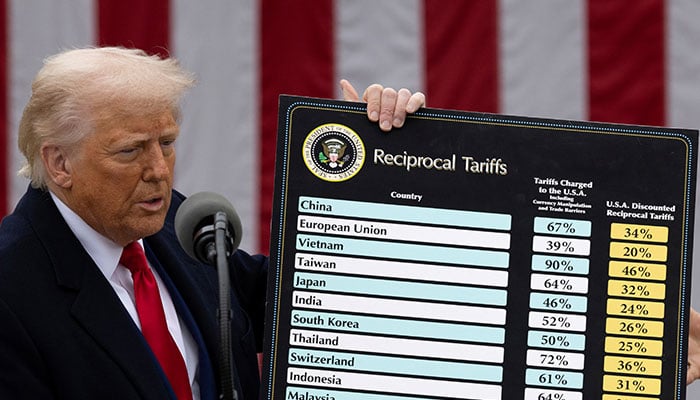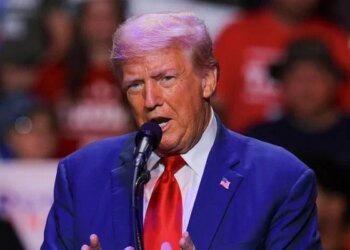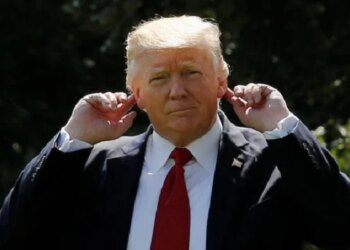Select Language:
- Trump claims the administration is bringing jobs back like never before.
- President Trump describes new tariff policies as an “economic revolution.”
- The EU states they will respond in a “calm, carefully phased, unified way.”
U.S. President Donald Trump reaffirmed on Saturday his administration’s sweeping tariffs imposed on various countries, cautioning Americans of potential hardships but pledging unprecedented investment and prosperity.
The president’s remarks occurred as his most extensive trade measures came into effect, possibly provoking retaliatory actions and escalating economic tensions, with both British and French leaders indicating that “nothing should be off the table” in their responses.
Recognizing worldwide instability, Trump urged Americans to remain patient.
“We have been the foolish and powerless ‘punching bag,’ but that’s over. We’re bringing jobs and businesses back like never before,” he posted on Truth Social.
“This is an economic revolution, and we are going to prevail,” he continued. “Stay strong; it’s not going to be easy, but the final outcome will be unprecedented.”
A 10% “baseline” tariff took effect shortly after midnight, impacting most U.S. imports except those from Mexico and Canada, as Trump invoked emergency economic powers.
However, in a possible point of contention between Trump and his close advisor Elon Musk, Musk mentioned on Saturday that he hoped the U.S. and Europe could move towards a “zero-tariff situation.”
This vision could potentially establish a “free trade zone between Europe and North America,” Musk shared during discussions in Rome with Italy’s far-right Deputy Prime Minister, Matteo Salvini.
The EU, Japan, and China are among about 60 trading partners set to experience even steeper tariffs beginning on April 9.
Trump’s heavy 34% tariff on Chinese imports, set to commence next week, prompted Beijing’s declaration of a matching 34% tariff on U.S. goods starting April 10.
Beijing also announced plans to challenge the U.S. at the World Trade Organization and restrict exports of rare earth elements essential for medical and electronics technology.
“China has suffered far greater than the USA, not even close,” Trump asserted in his social media post. “They, along with many other nations, have treated us disgracefully.”
As other key trading partners prepared for potential recession, French and British leaders stated that “nothing should be off the table.”
At the same time, they concurred in a call that “a trade war would be detrimental to everyone,” according to Prime Minister Keir Starmer’s office.
Market Instability
Wall Street plummeted on Friday, mirroring steep declines in Asian and European markets as economists warned that tariffs could stifle growth and exacerbate inflation.
Nonetheless, Trump’s latest tariffs feature significant exclusions.
They do not overlap with recently imposed 25% tariffs on imports of steel, aluminum, and automobiles.
Additionally, products like copper, pharmaceuticals, semiconductors, and lumber, as well as “certain critical minerals” and energy goods, are temporarily exempt, according to the White House.
However, Trump has initiated investigations into copper and lumber, which may soon lead to additional tariffs.
He has hinted at pricing other sectors like pharmaceuticals and semiconductors, potentially shortening any reprieve for these industries.
Goods from Canada and Mexico are not affected by these newest tariffs as they already bear different duties of up to 25% under a trade agreement.
Risk of Retaliation
While Trump’s staggered implementation timeline allows for negotiations, “if they can’t secure a reprieve, retaliation is likely, as China has already done,” warned Oxford Economics this week.
EU Trade Chief Maros Sefcovic remarked that the bloc, facing a 20% tariff, will respond in a “calm, carefully phased, unified manner” and leave room for discussions.
However, he emphasized that it “will not remain passive.”
France and Germany suggested the EU could retaliate by imposing taxes on U.S. tech firms.
Japan’s Prime Minister has advocated for a “cool-headed” response following Trump’s announcement of 24% tariffs on Japanese products.
Since resuming the presidency, Trump has levied tariffs on imports from Canada and Mexico over issues related to illegal immigration and fentanyl trafficking, alongside an extra 20% surtax on goods from China.
By April 9, these additional tariffs will total 54% on Chinese imports this year.
Trump’s 25% auto tariffs have also been activated this week, leading Jeep-maker Stellantis to halt production at certain facilities in Canada and Mexico.
Trump’s new global tariffs represent “the most significant increase since the Smoot-Hawley Tariff Act, the 1930 legislation infamous for igniting a global trade conflict and worsening the Great Depression,” according to the Center for Strategic and International Studies.
Oxford Economics estimates that these actions will elevate the average effective U.S. tariff rate to 24%, “surpassing even levels seen during the 1930s.”







